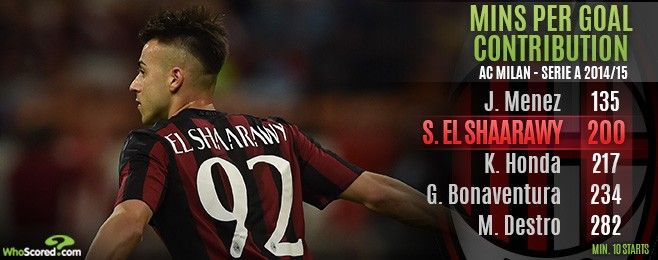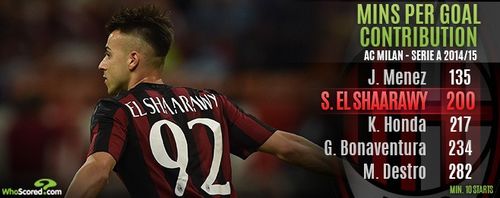
Stephen El Shaarawy sale to Monaco could come back to haunt AC Milan

Stephan El Shaarawy pulled outside the gates to Milanello and stepped out of his car. Even in casual dress, his colours were coordinated with those of club. The sides of his sunglasses were red and the frames were black. His T-shirt also matched. A group of starstruck teenage girls had gathered like screaming fanatics outside the stage doors at Justin Bieber concerts. El Shaarawy patiently penned autographs and posed for photos. After receiving a kiss on the cheek, one fanned herself as though she were about to faint.
If only they had known that the object of their affection would be leaving the club that same day. Imagine the tears. Popular, and not just with the ladies, El Shaarawy’s transfer to Monaco [initially on loan for €3m and on a permanent basis for a further €13m once he makes 15 appearances] has divided opinion among Milan fans. There was a time when he represented a bright new future at the club. The post-Zlatan era. Now it looks like he might only have been the interim.
The treatment of El Shaarawy has often been perplexing to observe.
While on international duty at the Confederations Cup two years ago, El Shaarawy was unsettled by reports back home that Milan were encouraging Napoli to send some of the money they were about to bank for Edinson Cavani their way in exchange for his services. Asked to comment by La Repubblica on more paper talk suggesting Milan had met Manchester City and were offering him as a bargaining chip in a deal for Carlos Tevez, El Shaarawy said he knew nothing about it and didn’t want to know either.
His intention was to put down roots in Rossonero. Not that it stopped Milan leaving the impression that he might be available for the right price. “He’s the Milan player generating the most interest,” chief executive Adriano Galliani said. “But I’m yet to receive an offer.”
It felt like Galliani was fishing for one, in particular from members of the nouveau riche. First City then Monaco. The club that well and truly took the bait, however, was Anzhi. They bid €40m and put a contract worth €7m a year on the table. It turned out to be an offer El Shaarawy could refuse. He couldn’t understand though why Milan were even bringing it to him. Had he not made it clear? He didn’t want to leave.
Just pause for a moment to think how confusing it must have been for El Shaarawy. Why would Milan even countenance selling their boy wonder after a break-out season in which he had emerged as one of the most exciting talents in Europe?
The club ought to have been grateful to him. El Shaarawy had helped ensure Milan improbably got into the Champions League play-offs even after the painful but necessary cuts that manifested in the sales of Ibrahimovic and Thiago Silva to Paris Saint-Germain. Though they were not yet guaranteed a place in the group stages, maybe that’s why they considered cashing in, El Shaarawy was the one who scored Milan’s away goal in the first leg against PSV that put them in the driving seat to get there.

Fast-forward to this summer and the head scratching continues. A year ago, Pippo Inzaghi resolved to build his team around El Shaarawy. That’s why he chose 4-3-3 and looked to play on the counter-attack and although it wasn’t a success there was a sense that it wouldn’t have major repercussions for his protégé, not least because of the apparent direction in which the club was headed.
After signing Mattia Destro, Alessio Cerci, Gabriel Paletta, Salvatore Bocchetti and Luca Antonelli in January, almost all on loan, owner Silvio Berlusconi once again shared his vision to reimpose an Italian identity on Milan.
Recruitment strategy would almost exclusively be centred around acquiring players who are young, gifted and from Italy like they did in 2010 when, after watching El Shaarawy inspire Padova to the play-offs in Serie B, they cut Genoa a cheque for €7m and threw in Alexander Merkel for good measure to co-own the player already known on account of his father’s Egyptian heritage as the little Pharaoh.
A glance at Milan’s business so far will tell you however that there’s a big difference between what they say and what they do. New contracts for Nigel de Jong and Philippe Mexes have both received Berlusconi’s blessing even though, as foreign players in their 30s, they are in complete contradiction of his plans for Milan.
Meanwhile El Shaarawy has been sold as there is no longer room for him after the club bought a Colombian centre-forward and a Brazilian one too, both of whom will expect to play and require the system to change to a narrower set-up without any of the attacking width he excels in.
Now many of you will notice parallels with this time last year when, after spending a lot of time and resources in the development of academy graduate Bryan Cristante, Milan opted to sell him to Benfica and loan Marco van Ginkel from Chelsea only to then decide not to make it permanent.
The trend could well continue if, as reports last week would indicate, any deal to bring Ibrahimovic back to San Siro will include Hachim Mastour, the 17-year-old on Milan’s books, going to the Parc des Princes. Mastour might be nothing more than a YouTube phenomenon, a freestyling performing seal in the Kerlon mould, but he also might be a bona fide wonderkid.
What adds to the incredulity around trades like this is Mauro Tassotti’s new role. Assistant manager since 1997, his job now is to follow the players who are out on loan and monitor their development closely to see whether they are ready and able to come back and play for the first team. The motivation for this is, in Tassotti’s words, to ensure “there are no longer any cases like Matteo Darmian’s” who Milan let go too soon and too cheaply. It hurts them to see that he’s now a regular for Italy and worthy of a move to Manchester United.
So the question is: Are Milan making a similar mistake with El Shaarawy? Well, let’s look at it from their perspective. It’s true they are very top heavy and short at the back. Selling El Shaarawy makes sense as Sinisa Mihajlovic has no use for him and the money can be used to buy a centre-back, who might after all be the young, gifted and Italian, Alessio Romagnoli.
Milan could also argue that El Shaarawy was a flash in the pan. Sixteen of the 27 goals he scored in four seasons at the club arrived during a four-month spell in autumn and winter 2013. He only found the back of the net three times last season and the first, against Sampdoria in November, reduced him to tears, for it ended a 622-day drought without one in Serie A.
A lot of that time, it must be said, was spent out injured. A fractured foot and the subsequent relapse meant he missed all but six games of the 2013-14 campaign. “He’s becoming the new Pato,” wrote Il Corriere della Sera. When El Shaarawy did play, he was criticised, even by his own coaches, for being too one-dimensional. Defenders knew what was coming. He’d start out left, cut inside and look to find the far corner. Easy.

In El Shaarawy’s mind Milan did much to undermine his confidence and his development. Why buy Mario Balotelli and move the system away from El Shaarawy’s strengths? Why tell him that his game was wrong and that he had to relearn it completely rather than carry on doing what he did best? Why recommend the course of treatment they did for his foot injury?
Consider the instability at the club too. Milan have gone through more coaches in El Shaarawy’s time at San Siro than they had in the previous 15 years. Clarence Seedorf and Pippo Inzaghi were both novices. How could they realistically improve him? Desperate to get back into the Champions League, were it to happen, Ibra’s return would underline Milan’s short-term focus. There is no long view.
El Shaarawy might be flawed but, in the right environment and with the right coaching, he can still add facets to his game and render it less predictable. Monaco’s raison d’etre these days is talent development. They’ll be confident of making El Shaarawy a €40m player again. Leonardo Jardim has a track record of making players better. His teams play a style and a system that suits El Shaarawy.
Monaco recorded 31 clean sheets in all competitions last season. Their defence was the best in Ligue 1 by a distance [26 goals conceded], as was their away record. It speaks to how rock solid they are at the back and the platform it gives to be lethal on the counter, with only two teams scoring more goals on the break in France last season (4).
Under less pressure and scrutiny, there is no reason he can’t have the success Marco Simone had in the Principality, providing of course he stays healthy not least because, though fragile, his injuries aren’t the same as Pato’s. They haven’t robbed him of any speed.
Are Monaco a step down? In prestige terms, yes they are, but it is a step in the right direction for El Shaarawy. Ahead of Euro 2016 in France, he’ll get the chance to impress Antonio Conte by playing regularly and, unlike at Milan, could find himself back in the Champions League group stages depending of course on how Monaco fare in the play-offs.
Lest we forget as well, Milan have got it wrong more than they have got it right in recent years and their judgement is not unquestionable. For now and the foreseeable future they’ll be hoping the curse of the Pharaoh isn’t real and that this move doesn’t come back to haunt them.